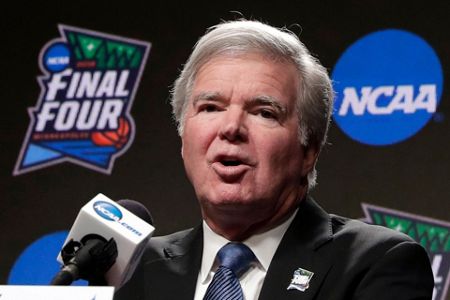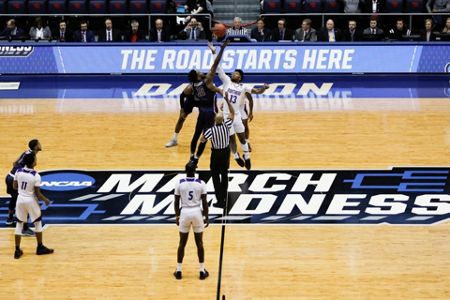ROSEMONT, Ill. (AP) — NCAA President Mark Emmert told the association's more than 1,100 member schools Friday that he will seek temporary rules as early as July to ensure all athletes can be compensated for their celebrity with a host of state laws looming and congressional efforts seemingly stalled.
In a memo obtained by The Associated Press, Emmert urged members to pass legislation by the end of June that would for the first time make it permissible for college athletes to earn money off their names, images and likenesses.
All three divisions of NCAA athletics have been working toward reforming NIL rules and lifting restrictions on athletes since 2019.
“Since that time, many states have enacted NIL legislation and 10 state laws can take effect this July. It is therefore essential we now enact rules before the end of the month,” Emmert wrote in an email sent to presidents and chancellors, athletic directors, senior compliance administrators, conference commissioners and others.
The NCAA Division I Council meets Tuesday and Wednesday and could act on an NIL proposal that was expected to be voted on back in January.
Instead, Emmert encouraged membership at that time to put the vote on hold after an the Justice Department notified the NCAA that it's proposed rule changes could violate antitrust law.
Since spring, Emmert has encouraged membership to move forward on NIL reform and has said he was confident new rules would be in place before the start of next football season.
Six states have NIL laws set to go into effect July 1 that will permit college athletes to be paid for endorsements, personal appearances and social media posts, setting up the possibility of patchwork rules from coast to coast for thousands of athletes.
"By July, all our athletes should be provided NIL opportunities regardless of the state they happen to live in," Emmert wrote in the memo.
The NCAA has asked Congress for help in the form of a federal NIL law that would set uniform standards and preempt state laws. But it appears nothing will get done in Washington before the August recess.
Emmert wrote that if NCAA rules changes are not in place by July, he will take action.
“I have directed my staff to create proposals to this end. We will provide more details next week as this approach is reviewed by the NCAA Board of Governors and the divisional governance bodies,” he wrote.
Ramogi Huma, executive director of the National College Players Association, said the NCAA should have taken more aggressive action after California became the first state to pass an NIL law in 2019. The NCPA has been working with lawmakers on bills that address NIL and other college athlete issues.
“This memo is an admission that the NCAA is not helpless and that it's merely asking Congress for a favor,” Huma said in statement to AP.
The NCAA's plan is to allow athletes to be paid by third parties. The schools would not be involved in the transactions.
The NCAA does want to place some limitations around NIL rights and to be able to monitor athletes' deals to prevent payments from being used as recruiting inducements.
Athlete advocates want unfettered access to the free market, though even state laws soon to be in effect in Alabama, Florida, Mississippi, Georgia, New Mexico and Texas place some limitations on how athletes can earn money off their fame.
In Washington, there is consensus among lawmakers there should be a federal law guaranteeing college athletes the ability to make money from NIL. But leading Democrats would like to extend their reach into other areas of college sports such as regulating long-term health care and education opportunities for athletes. Republicans want to focus on a more narrow NIL bill.
Both parties have questioned whether the NCAA and Emmert have the ability to successfully lead and govern college sports.
“This is an important moment for college sports and particularly for our athletes,” Emmert said. “We must act to ensure that fair opportunities, consistent with our values, are provided to all student-athletes.”
Also hanging over the NCAA is a pending Supreme Court ruling on a case involving restrictions on athlete compensation. The so-called Alston case is not about NIL payments, but some college sports leaders are concerned that the high court’s decision could have a wide-ranging impact on the NCAA’s model of amateurism.
__
Follow Ralph D. Russo at https://twitter.com/ralphDrussoAP and listen at https://APpodcasts.com
___
More AP college football: https://apnews.com/hub/college-football and https://twitter.com/AP_Top25
___
This story has been corrected to show six states have NIL laws going into effect July 1.
Copyright 2021 The Associated Press. All rights reserved. This material may not be published, broadcast, rewritten or redistributed without permission.




